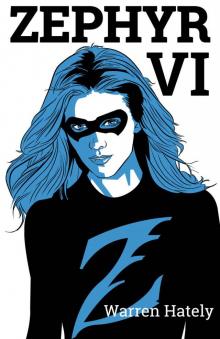- Home
- Warren Hately
Endless Night
Endless Night Read online
Day and the Endless Night
Warren Hately
Copyright 2013 Warren Hately
In a post-apocalyptic “now” where ancient magic and technology collide, a wanderer must escape a vast concentration camp run by vampires in . . .
ENDLESS NIGHT book one
Contact the author at wereviking @ hotmail.com, follow @wereviking on Twitter or visit www.warrenhately.com for more.
Cover by Federico Musetti
federicomusetti.it
Day huddled into himself, watching the others fight over the quarter carcass of antelope. Among his people, various animals were considered holy and to Day, the antelope was the main one holy to him. His token beast. Yet it was with jealousy rather than detachment that he watched the men and women tear the side of meat to shreds.
It was a fact of life that he couldn’t indulge in the animal’s meat this way. There was a process for appeasing the Antelope spirit, his father had taught him, which purified the meat so that it could be consumed free of consequences. On the Farm, such rituals weren’t possible.
The first male-female pair broke away from the others, the woman clutching the leg like a trophy, the man letting her carry it so he could defend them if needed. Yet no one followed as they tracked away across the cold, unbroken ground to where a cooking fire was smoking and three others, one of them a rare sight, a child of about ten years old, waited with scavenged pots and expectant leers. Day followed them with his eyes only. Then he switched focus to the black helicopter turning from its previous flight path and veering back towards them.
Perhaps a half-mile off, the chopper’s crew threw another large animal-shaped chunk, probably antelope again or possibly the tail end of a cow. The tumbling meat had two legs and it cart-wheeled to the ground heavily.
If there was something he could eat dropped on the next pass, Day was ready to claim himself and the woman a piece. At his side but kneeling, she wore his long mottled blanket like a poncho, meaning Day had no way to conceal his knife except under the bicep of his folded arm. Its position was just another reason for his frozen posture. He stood there, decidedly more lean than when he arrived two months previously; but so far, he was still healthy, or surviving, at any rate, his normal body fat stripped back now so that only the large muscles of his upper body showed, his broad shoulders and chest, sunken-looking with the bifurcated muscles that bunched according to symmetry highlighted by the line of hair that ran down the middle of his body and disappeared under the waist of the hide kirtle he wore for modesty’s sake. The trail of tattoos across his shoulders and upper body were like a shawl, his skin fringed in a band of ink, stylised but primitive-looking animal shapes in a procession from right to left.
The woman lifted her slumped head at the sound of the oncoming helicopter. Day felt her body tense even through the worn and grimy fabric of his black track pants. She was warm at last in the blanket, her strawberry-blonde head poking through the hole made for his thicker neck; and she had ceased the shivering that irritated Day so much in their first week together. By now she had enough resolve to help him with the foraging, and it was a stupidly sentimental sign of her own appreciation of his presence that she ignored the antelope when it first tumbled out of the chopper even though she was from, as she had haltingly said, Missouri, and they didn’t have any such customs as Day’s people practised in the Rocky Mountains.
Now she was following the helicopter’s approach as attentively as him. Day was glad. It was now coming towards the end of the second week since he had picked her up, literally, off the ground from where the others had left her. The women had moved in after the men and kicked her even further into submission before stripping her of her precious outsider clothes. The farm was a lonely place despite Day’s field having anywhere from two to three thousand people in it at one time. First arrival was almost always cruel – shockingly so for the experience being so sudden and new, a grisly, disheartening induction to a terrible new life.
People weren’t picky about companionship since no one knew what was going to happen from one day to the next. Day knew it sounded bad to say he nursed the woman back to health for the sake of keeping himself busy, but it was more than halfway true. Despite it being mid-Autumn, the days seemed longer than he was used to in the mountains, with the vast open flatness of the land leaving him and the rest of the human herd exposed to the merciless winds that criss-crossed the country. And human warmth was part of that motivation, though it had cost him his precious poncho to stop the woman dying of pneumonia. They slept huddled close together, his arms buried to the elbow inside her top on a patch of dead grass Day had staked out for his own. With the grass at least he was slightly insulated from the cold that seeped through the naked sand and greasy clay.
There were plenty of other solos like himself. Mostly they were men. The females usually submitted quickly to someone’s authority – male, female or mob – for the sake of making their time on the farm just a little less brutal. Or so they hoped. Many died that way. Those that didn’t submit ended up under someone’s power fairly quickly anyway, or left for the vultures if there were any game enough to land for a meal since, in a grand irony, they too were fair game to the inhabitants of the farm; and these poor lonely corpses were an abject lesson for anyone who thought they could do it otherwise.
Day had briefly spoken once with a collective of five women, only a few days after he himself was deposited in the field. They’d let him get no closer than twenty yards. Their group was led by a tall, strong-looking woman of middle years called Maya, and she assured Day no one had “messed with” them since they were brought in together. As far as Day knew, the little collective was still running, though the odds were they had lost a member or two in the two months since. He’d seen them at a distance from time-to-time, armed with sticks or with rocks stuffed into sacks, standing up for themselves and their share of the foraging. Day had thought briefly about turning the woman over to them, but in the end his own selfish motivation won out.
She had never given her name or spoken more than a word or two at a time, but Day thought she seemed to appreciate his intervention. Twice now he’d defended her against other men. The first was stupid enough to come on his own. It was his knife Day now concealed under his arm. The second try was by two men, but they had retreated when neither could get close to the woman without their arms or hands getting nicked.
Day hadn’t even tried to kill them, though on the farm it was common enough – a weird sort of industry, in fact, with its own grisly by-products, recycling and inheritances. The bodies were usually dragged to the fence line under cover of darkness to be harvested by the ghouls after the sun rose. A certain collateral damage seemed to be factored into the farm’s operation by their grim masters. There were at least six more fields surrounding the one where Day was imprisoned – or at least that’s what the hexagonal outer walls suggested. The harvesters clearly expected to lose a few of their human cattle in the course of carrying out the work.
“Meat,” the woman said, bringing Day back to the task at hand.
Sure enough, another lump was bundled out of the helicopter as it shuttered towards them. Day couldn’t be sure if it was the same chopper that had dumped the antelope – in which case antelope might be all they were carrying – but there was another speck further off also making deliveries.
As they watched, two more packages were hurled from the chopper before it started turning in a slow, lazy arc. Day grabbed the woman by the shoulder of the poncho and pulled her up.
“Move,” Day said. “They’ll pass over that way,” and he motioned with his knife at a vague spot past another cluster of cooking fires and hide-and-canvas tents.
The woman grunted her agreement and they brok
e into a run. A few more people stood about, shielding their eyes to better watch the helicopter’s movement in the dying afternoon light. Day led his companion past a pair of men and a woman holding cooking pots as weapons – the woman an iron bar – but Day’s decent size, his apparent energy and the bare knife short-circuited any aggression. Perhaps it also counted that they carried hardly anything else.
Day and the woman were still running forward as the helicopter’s shadow crossed them and another parcel fell out of the sky. It hit the ground near an old man wearing one of the pieces of blue plastic sheeting they delivered by airdrop from time to time. The plastic was for shelter. Though Day hadn’t seen anyone dressed in the stuff before, he wondered that it didn’t make a certain kind of sense – though of course, unless there was something underneath, it would be freezing cold at night. He locked eyes with the old man, still running, and then they both looked at what had come down to the dusty ground between them.
The antelope’s head had bent back with the impact and its one foreleg was raised as if to paw the ground. Day sighed, losing all momentum, but he urged the woman on towards it. He realised they had been running hand in hand. He flicked his wrist to propel her on. She turned to meet his gaze, her warm brown eyes bloodshot with fatigue and concern, her darker, slightly grit-smeared eyebrows furrowed. After a moment she held out her hand.
“Knife.”
While she started cutting the animal back, opening the damned thing up, Day turned to the old man who stood frozen, watching the woman stuff a piece of raw meat into her mouth and then resume her work.
“You’re not taking any?” Day said to him. He felt sympathy for the old fellow, perhaps the oldest he’d seen since his arrival. “You should. We’re lucky. No one else is around.”
“You would . . . let me?” the old man asked in a startled voice. He had to clear his throat as if dusting off old vocal chords.
“Yes,” Day said firmly. “You need food. Go on. The woman will share.”
The man moved forward in a spidery way. Within moments, he and Day’s woman were working cooperatively, cleaning the antelope out.
It was more meat than she could carry and, besides anything else, that much meat would go off before she could eat it all. Carrying too much would just make them targets for other parasites. To avoid the big gangs, you had to travel light, surviving on as little as possible.
Along such lines, it wasn’t from the helicopters that Day had hidden the blade. When the harvesters came, they were hardly worried about a man with a knife. The things which turned up on the farm from time-to-time, some of them even junked out of the helicopters, quickly became precious commodities. Day recognised this fact almost instantly on arrival, looking at the bedraggled masses confronting him and his fellow passengers, their clothes a mix of hides taken from the meat deliveries and materials infrequently airdropped, added to whatever was left to them from when they were caught. Without a word, Day had removed his shoes and the piece of flint he wore around his neck and threw them away, letting someone else fight over them, maybe die for them. The flint had been precious, too, but none of them on the cargo helicopter knew what they were headed into. Otherwise Day might’ve thought to swallow it.
Since then Day usually avoided the centre of the field because of his unfounded belief the impromptu shanty-town was the first place from which victims were harvested. Neither did he cling to the gates and fences like the suicidals or the insane. Each field would be at least a dozen miles square. Night noises suggested there were others, as did the thousand rumours and legends of the field, the stories of people communicating from across the fences.
People had room to roam if that’s what they wanted. Though he could never leave, Day felt it safer to keep on the move.
“Are you coming to eat some?” The man held up a juicy prime cut. “This piece looks good.”
“No.” Day shook his head firmly. “I don’t eat antelope.”
The old man’s eyes crinkled as he looked at Day a moment longer than seemed necessary. To his credit, rather than look away he spoke again. “You’re from Nebraska, aren’t you?”
Day nodded once. “The HOAH commune,” he said, not explaining it was an acronym for Hide Our Asses Here. For the children of Day’s generation, Hoah was a real word for them, one which meant safety and home.
“You’re Prehistoric, old boy,” the man said with a cheerful smile, motioning vaguely, but presumably at Day’s tattoos.
“If you say so,” Day said. Their accents were different. The old man’s was like the overseas way his father’s best friend Colin McNab spoke, though he did it with less cursing. “My customs are the customs of my people,” Day said.
“Tribals,” the man replied and sighed.
He started eating the piece of meat and then excused himself, turning away. It occurred to Day that if the commune had anyone of Miranda Stockdale or Steelheart Birch’s age still alive, they would be contemporaries to the old man. Such being the case, the plastic-wrapped survivor was a leftover from the time before the Rising and would do as the old people had always done, comparing everything constantly to what had gone before.
“It’s a new age,” Day said in his own defence. “The old ways did not protect anybody.”
The man didn’t point out to him that animism was one of the oldest ways known to man. Day’s father had taught him that – it was the whole point in their made-up religion, after all. Day watched the old man pile his two hands full of the cuttings he had made with the woman’s help without any comment and then stand. His white beard was stained by the fresh meat already.
“Thank you,” he said simply.
Day nodded again and the old man walked off.
“We should find a fire for you,” Day said to his companion after a few more minutes passed. “You don’t want to eat raw meat. You’ll throw it up.”
“Fire?” she sounded doubtful.
“Yes,” he nodded, knowing what she meant.
They had no means of starting their own fire, which meant approaching someone and trading to use their implements. Three days earlier he had collected seven handfuls of wooden chips and twigs and bits of scrap to trade for their next time, but three men and a teenage boy had come along and threatened him while the woman was away. After a full day’s gathering, Day threw the collection into the air and left them to it.
“We have meat. A little, for them,” Day reasoned.
The light was rapidly leaving the land. At night the enmities of daytime were put aside as groups huddled together in the shadows. Meanwhile, the solos crept off and slept in hollows in the ground where they hoped they wouldn’t be found. It was a good tactic, one Day had employed himself, but nothing could offset the feelings of dread and quiet panic that infused the soul as the sun slowly lowered – like a fat man ready to take a shit, as McNab had once described it.
After three aggressive encounters followed by equally quick withdrawals, they came to a fire where they could only see an old woman and a young man who was about Day’s age and, like him, big for it and strong-looking from the hardness of life. The old woman was his mother, who’d been captured along with her son from their farm on the northern border of New Mexico. Their father, it turned out, had already been taken in the night four weeks earlier. The son spoke with a curiously bright expression fixed on his face.
He was eager to trade fire and tools for cooking in exchange for meat, but it turned out he was interested mostly for his mother’s sake. Despite the agreement of all sides, it turned out she took little food and had even less to say. As darkness fell, the woman withdrew into a tiny plastic tent made out of some sheeting strung between two stunted shrubs. The son, whose name was William, sat with Day and the woman, cleaning meat from antelope ribs while telling the rest of his story in the manner of a confession.
From William, Day finally learnt the farm was also based in the state of New Mexico. It was only a few hours from William’s parents’ property. No one knew of the
farm’s existence, since three hours beyond the gates of the sheltered night-fortress that William called Bootless was the farthest extent of land the freehold farmers could keep in their control. The community of about six hundred worked the fields at daytime and retreated into Bootless at night. The farthest fields were filled with low maintenance crops on account of the small amount of time anyone could spend tending them and still hope to get to sanctuary in the evening. At harvest time, William said, half the men went together and built a mobile camp and set heavy night watches, and they took a lot of hay bales with them so they could keep strong fires burning through the night.
They’d known a lot of bad things were astir in the world, but they knew nothing about the farm.
“Six hundred people,” Day whispered in a softly awed voice. “I can’t imagine it. We’re about sixty, where I’m from.”
William shivered and looked unseeingly into the darkness. It was clear he wasn’t well, at least mentally, but that didn’t concern them.
“Where’s home then?”
“Nebraska, in the foothills of the Rockies. Still high ground. A lot of the monsters don’t like heights, it seems,” Day said with a gentle smile.
“I’ve been here forty-eight days,” said William.
Day felt the woman’s hand on his thigh, comfortable, as she continued chewing the illicit meat. It smelled good, but he hadn’t hunted the animal himself and so he would be obliged to its spirit and haunted for a long time if he ate the body without permission, or so he believed – or perhaps he believed. He didn’t understand why others weren’t afraid of this punishment and also why they never suffered for it. They, however, had not had the Antelope and the primeval Elk specifically named as their spirit guardians at birth.
“I’ve been here a little longer,” Day said.
The black shape crashed out of nowhere, scattering sand and coals from the fire. Day reared back, pulling the knife from the loop of hide he’d made in his belt. William gasped and likewise tumbled backwards from the fire. Then he scrambled in a mad panic and literally lay down on top of the plastic hootchie in which his mother was sleeping. At the same time and as a direct result, the old lady woke up inside and started screaming. William screamed back for her to be quiet and stop moving.

 Hard Light- Infamous
Hard Light- Infamous Frontline
Frontline After the Apocalypse Book 3 Resurgence: a zombie apocalypse political action thriller
After the Apocalypse Book 3 Resurgence: a zombie apocalypse political action thriller After The Apocalypse Season 1 Box Set
After The Apocalypse Season 1 Box Set Zephyr Box Set 2
Zephyr Box Set 2 Zephyr Box Set 1
Zephyr Box Set 1 Endless Night
Endless Night After the Apocalypse Book 1 Resurrection: a zombie apocalypse political action thriller
After the Apocalypse Book 1 Resurrection: a zombie apocalypse political action thriller Zephyr III
Zephyr III Zephyr I
Zephyr I Zephyr VI
Zephyr VI Zephyr IV
Zephyr IV Zephyr II
Zephyr II